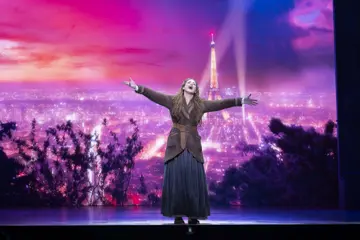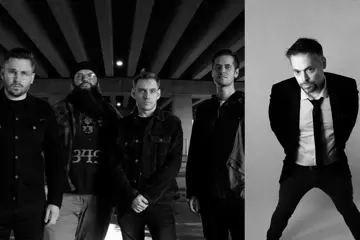What a film intends to be and how an audience interprets it can be two different things; and, from that conflation can kick in, and the director who hoped to make an open-ended portrait of a subject is, when viewed through the prism of public perception, retroactively made an acolyte of a singular reading. This is exactly how it feels to watch Zero Dark Thirty, a grim, joyless, at-what-human-cost procedural that becomes, when rolled out to mass American audiences (and, indeed, Oscar voters), a piece of flag-waving propaganda that condones the war on terror, torture, and the billions of dollars burnt chasing a symbolic devil whilst a crumbling Empire went into financial collapse. Though it may sprawl out to nearly-three-hours, sift through all manner of moral greys, and follow a non-generic narrative that tos and fros in unexpected ways, if you look at the beginning and finish, the film can be reduced to the simplest of stories; the goalposts at each end casting towering shadows out over all the action out on the field of play. In short: Zero Dark Thirty begins with September 11, and ends with the death of Osama Bin Laden; an ungainly, ugly sprawl of history turned into the most binary tale of crime and punishment, all those greys brought into a more contrasty black-and-white. No matter that Mark Boal's screenplay is, in many ways, about the emptiness of justice, the great failures of the virtuous pursuit, and the dangerous concessions of an at-all-costs directive: all that matters is that audiences will take this as a military-thriller in which evil is committed, a villain escapes, and, eventually, is shot dead. Like an '80s action-film in which a man with large pectoral muscles and witty one-liners is condoned to kill as many people as possible in pursuit of justice, all that matters is that the final target is hit; all the deaths along the way are collateral left uncounted; the unfortunate cost of doin' business, of All-American vengeance. Rambo spun revisionist fantasy to give Americans closure for Vietnam; Zero Dark Thirty hews to historical accuracy, yet submits that to a boiled-down, writer's-license simplicity, giving contemporary Americans closure for, fuck, I guess the whole the 21st Century.
Which is not to say that this is its intention; Boal and director Kathryn 'Bam Bam' Bigelow may be out to make a completely different film; even if the privy of their military access suggests not. The film implicitly condones torture, even as it presents the true, hideous, inhumanity of it without salaciousness or favour; the masturbatory delight of modern-horror's torture-porn bloodletting the antithesis to the blunt, dumb ugliness of 'enhanced interrogation techniques' shown here. As both audience and just-introduced neo-heroine Jessica Chastain stew in shared revulsion, Zero Dark Thirty is hardly in the business of military glorification (that comes later, with Chris Pratt, Joel Edgerton, their cod-pieces, and cool-ass night-vision visuals); but when the torture leads to a piece of vital information, this past horror - this national Gitmo shame - becomes a necessary evil of by-any-means extraction, the action-movie cop roughin' up some stooges to keep the procedural moving. Befitting its procedural nature: once there's a minor clue, Chastain goes into sleuthin' mode, and a large ensemble of players (Home & Away alumnus Jason Clarke, chiefly, then Jennifer Ehle, Mark Strong, Kyle Chandler, James Gandolfini, Mark Duplass, Édgar Ramirez, and so on) are drafted in and out to either serve as pricks for our heroine to kick against, or caring accomplices that can see the veracity of her vision. Like so many procedurals, it's a film about ongoing obsessions and tiny details; the ability to take a handful of abstracted facts and see the grand narrative standing, as always, as a self-flattering symbol for the cinematic arts.
There's an artfulness to all of this that may be lost in the 9/11-to-Obama-killing reduction: the way the Hunt is set to a slow, slow burn, testing the patience of those out for blood; the way the climactic attack-on-the-Al-Qaeda-compound is told with reserved, dignified silence, and a kind of domestic mundanity; this a raid not on some final-stage-boss hide-out, but a Pakistani property housing women, children, a couple of in-retirement known-terrorists, and their organisation's paperwork. In the end, this demonised figure of anti-Americanism is no elusive spectre nor Bond-film villain, but a tottering old man hiding out in the attic. Boal and Bigelow's boasts of realism rarely hold much water, except in this final raid, and final kill; this whole sequence dark, disorienting, and decidedly non-glamorised, taking place in a sustained space of half-occlusion. The troops on the ground are not entirely sure whom they've shot, nor whether their mission's been a success; and, if you think that's too salty in its symbolism, their withdrawal from the area is the most difficult part of the, um, invasion.
Speaking of salty symbolism: there's a fantastic final scene in which Chastain - the dame that's tracked the case for years; refusing to play by the book and give up when the giving-up's good - sits in an empty military aircraft, the sole passenger on a heroic homecoming flight, fresh off the defining night of her life, the sweet champagne taste of a job-seen-through still on her lips. She's exhausted, but vindicated; her every sacrifice now worth it, her mindless devotion rewarded with retribution. But then the pilot spoils the mood, asking her where she wants to go. Chastain has no answer, for she has nowhere up next, her life instantly empty in the absence of the solitary pursuit that has consumed it; she now a careerwoman without a career; a soldier without a war to fight. Whereto after monomania? It's a great piece of writing because it calls into question the faux-heroic conclusion, and, effectively, everything that has come before; Boal capturing the weird, almost existential emptiness that comes when long-held dreams are realised; when, maybe, all that you ever wanted turns out to be much less than you expected. For a moment, Zero Dark Thirty captures the dissatisfying thematic drift of David Fincher's Zodiac; a fabulous filmic feint that brought audiences to the cinema with the promise of a cat-and-mouse serial-killer movie, only to slowly drew away the 'hook' of vengeance, until it become a provocative portrait of the world's essential injustice. Yet, even if this moment is Zero Dark Thirty's final moment - an end telling, the uneasiness lingering - it's still, only, just a moment; its frisson profound, yet fleeting. And, anyway, the way the filmmakers intended it and how the audience interprets it won't be one and the same.
Don't miss a beat with our FREE daily newsletter
Richard Linklater's suddenly-super-persistent Before Sunrise/etc films have long been revered as 'romance for realists', with the will-they or won't-they of their schedule-cross'd lovers keeping the suspense alive by having reality intrude; it's one thing being fated to be t'gether, another to be in the right place in your life to have that mean something. I'm searching for a similarly pithy-yet-philosophical 'romance for...' phrase to attach to the central romance in David O. Russell's wildly-praised, actually-pretty-embarrassingly-overpraised, awards-show-feted Silver Linings Playbook, which takes pains to differentiate itself from the endless cinematic landfill of cut-out/big-box rom-com fodder, yet still feels like an iteration - if but an idiosyncratic one - of the tried/tired-and-true 'romance for romantics'. Perhaps 'romance for romantics-with-a-particularly-skewed-and/or-genereous-acceptance-of-romance'; though, in reality, you wonder if that wrinkle is just enough to flatter viewers into believing they've experienced a piece of genuine auteurist eccentricity that just happens to resemble a three-act multiplex rom-com.
For realists Silver Linings Playbook is not: in spite of all the faux working-class-isms and dressed-down Hollywood stars and thematic tenor of professional tackle football, there's nary a hint of realism in Russell's comic concoction; which is very much in keeping with the spirit and sensibilities he showed in 1996's Flirting With Disaster and 2004's I Heart Huckabees, if never quite as inspired as either. It's another ensemble work whose comedy is often a product of its cacophony: there countless scenes where the director delights in having a whole houseful of characters yelling simultaneously. These ensemble players all harbour eccentricities and energies that make them walking generators-of-not-quite-jokes, but they never stoop to caricature; instead, Chris Tucker's twitchily-verbose mental-patient-on-the-lam or John Ortiz's bristling, anger-repressing, self-delusional husband-happy-renovating simply sit there, on hand, and in frame, radiating energy; buzzing like neon signs, a constant hum that contributes to the overall din. Each of those characters is there to, effectively, frame our hero; to stand as symbols of directions in which his life could go. They're also there to give contrasting life; as said hero, played by Bradley Cooper, often scans as lifeless; edging away from eccentricity towards everyman blandeur, feeling like some central cipher even when he's supposed to be the film's fulcrum, on which a thematic exploration of mental illness can pivot.
Matthew Quick's original novel positioned Cooper's character as unreliable narrator; the week-by-week, football-as-governing-motif plot viewed through the overlaid filters of bipolar disorder; the reader sharing the disorientation of the central character. Aside from a few poorly-staged flashback sequences and shots of Cooper grabbing his head, it's rare that Russell even attempts to get into that same headspace. Quick's chosen title, Silver Linings Playbook, marries that football motif with the slippery slope of its character's mental health; his attempted recovery built on the essentially-empty platitudes of self-helpy spun-positivity; his ability to will this glass-half-fullism into a genuine psychological seachange feeling as fraught, risky, and ultimately fatal as loving a sporting team; there a reason why the Philadelphia Eagles - eternal bridesmaids who made an art of snatching-defeat-from-the-jaws-of-victory - were the chosen embodiment of the insanity of sports fandom.
Russell is plenty interested in football - in the rallying power that it has over the community; in the way that rational humans can become irrationally superstitious sports viewers; in the essential self-flagellation of fandom; in the way fathers (Bobby DeNiro, washing off the Fockers stink with his best performance in decades, probably) and sons mediate their relationship through the sanctioned safety of boys-playing-games - yet far less interested in mental illness. Flirting With Disaster and I Heart Huckabees had a far finer grasp of their butting-up-against-mental-illness thematic catalysts; Russell getting Jewish-neuroses and tenuous-social-façades, respectively, as both pure comic conceits and ones loaded with dark dramatic depths. Here, mental illness feels not understood from inside out, but drawn on over top; caked on like Jennifer Lawrence's eyeliner, as essentially-meaningless scrawl of rom-com quirk. Lawrence is the med-cross'd lover Cooper is feted from meet-cute first to end up with on kiss-to-pullaway close, and her character -and her performance - is the film's saving grace: there a sadness etched in every punchline, and a defiance-of-delineations in every inhabited instant. Which is a kind-of-fancy way of saying that Lawrence takes a character that could've been some gothed-out, crazy-chick iteration on the Manic Pixie Dream Girl - that could've been an empty beauty, a female fantasy as blank as a white sheet, awaiting your masculine projection - and makes her feeling aching and vulnerable and alive; makes her feel not like a fantasy piece, or even like a girl, but a woman, a human, a messy confluence of conflicts and contradictions and desires; the realest thing in a film that cares not about realism.
Lawrence's turn turns Silver Linings Playbook; if not on its ear, at least in a better direction; her firebrand refusal to submit to the hero making her a combative, eternally angry variant on the female-saviour; she nursing our mad man back to mental health with righteous ire. Her symbolic transformation is made manifest in a grand public display: when our two Crazy Kids have entered a dance-competition whose results will bring a convenient closure to a lot of convoluted, gambling-related B-story. He's fraught, she's drunk, and together - rank, bumbling amateurs, at best - they have the fate of the film's feelgood status on their shoulders, a date with destiny at their happy feet. And, after a film spent largely glowering in a Goth trench-coat, Lawrence peels away its dank pallor to reveal a bright body suit of sequin'd sparkle and va-voom curves; as if some oater outlaw swapping a black hat for a white, only infinitely more hourglass. Slutty Black wardrobe-changed into Virginal White, she has become the transcendent heroine, the virtuous vixen pulling the film out of a muddled mediocrity of family dysfunctionality and jokes-about-DeSean-Jackson. When Hangin'-with-Mr.Cooper has to go chasin' her through the streets and Russell's can't-believe-they-nominated-him-for-an-Oscar-for-direction-over-Paul-Thomas-Fucking-Anderson camera has to shake itself out of a mediocre stupor - you can feel the feelin'good audience pulling for the big romantic moment on close: she's the best thing in the movie, hurry up and kiss her already.
Flight feels like a perfect piece of American filmmaking: wildly indulging in cinematic depictions of essentially-adolescent rebellion, only to perform a last-minute flip-flop towards moral finger-wagging; a lifetime of vice summarily dismissed with the absolution of a wayward Christian recanting on their deathbed. Here, Denzel Washington plays a giant, swaggering black cock incarnate; a nightlifin', daysavin', superstar pilot who lives hard, works hard, plays hard, and drills the ladies hard (including Kelly Reilly, sadly failing to transcend type with a committed-but-kinda-crappy turn as a white-trash Southern junkie shooting up to, no shit, Sweet Jane and Under The Bridge). Throughout the picture, Robert Zemeckis - an utterly artless hack whose Oscar-endorsed status is an effective indictment of the whole she-bang - loves nothing more than painting his hero as a glorious roustabout; with a groanworthy funky-soul-music soundtrack and a series of comic stings making self-destructive alcoholism seem like simply being the life-of-the-party. Even when, on the eve of a safety-board hearing that could lead to his imprisonment, Washington falls wildly off the wagon, Zemeckis makes that shit zany; with fat John Goodman wheeled in to provide a blast of comic cocaine to right that wobbly ship, and the soundtrack letting you know this is all boy's-own hilarity. Only, then, having managed to bluff his way through the hearing and being praised for his heroism, Washington has - um, like, spoilerzzz, or whatever, I guess, if you're going to watch and actually care about the narrative of this shitty movie - a crisis-of-conscience, and comes clean, and looks into the camera and tells the kids that the drinkin' and the fuckin' stewardesses and the shotgunnin' planes coked up to your eyeballs is bad, very, very bad, and you should all never do it and please send me to jail. It's a craven case of attempting to have one's cake and eat it too, and if anyone could actually pull that off, it'd be anyone but Zemeckis.















